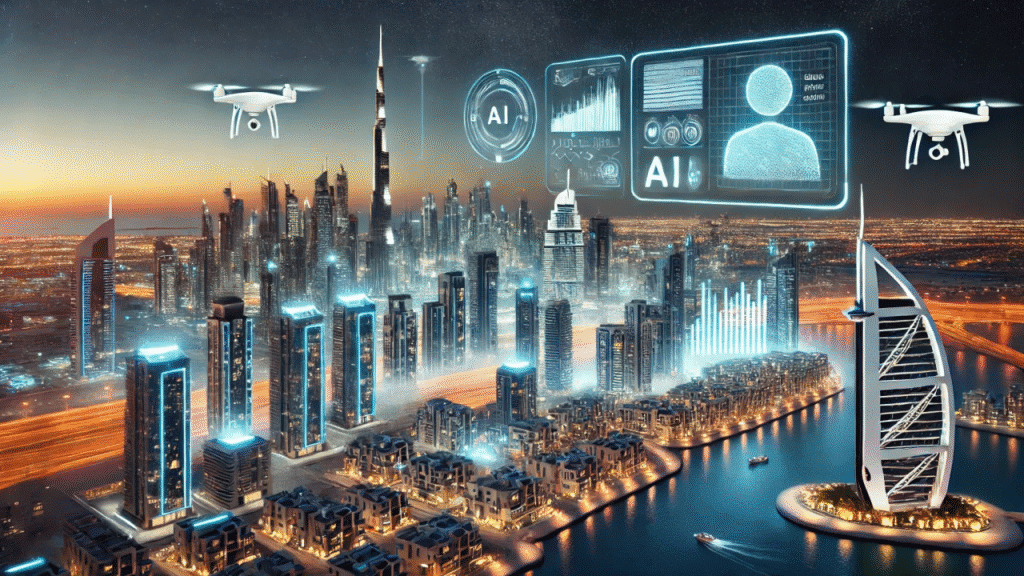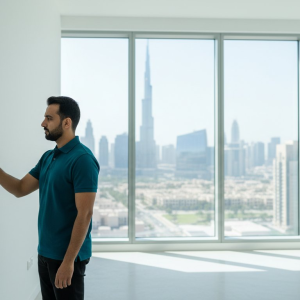AI and blockchain transforming Dubai real estate transactions, setting a new global benchmark for transparency, efficiency, and innovation. As one of the world’s most advanced property markets, Dubai is leading the digital revolution in real estate by integrating artificial intelligence and blockchain technologies into property buying, selling, and management processes. These innovations are reshaping how deals are executed, verified, and recorded, making Dubai’s property sector faster, safer, and more reliable than ever before.
This transformation is not just technological—it’s redefining trust, accessibility, and the overall real estate experience for investors, developers, and homeowners across the city.
The Rise of AI and Blockchain Transforming in Dubai Real Estate
Dubai’s real estate sector has always been a symbol of ambition and progress. From iconic skyscrapers to futuristic smart cities, the emirate continues to push the boundaries of innovation. With the government’s commitment to becoming the world’s smartest city, integrating AI and blockchain into real estate was a natural evolution.

The Dubai Land Department (DLD) has been at the forefront of this movement. Through initiatives like the “Real Estate Self Transaction” (REST) platform, DLD has digitized property transactions, allowing buyers and sellers to complete deals remotely without physical paperwork.
AI and blockchain together ensure that every transaction—from property listings to title deeds—is verified, secure, and accessible in real time, marking a major milestone in Dubai’s journey toward a fully digital property ecosystem.

Understanding the Role of AI in Real Estate
Artificial Intelligence (AI) is enhancing every stage of the real estate journey, from market analysis and property valuation to customer experience and fraud prevention.
AI-driven algorithms analyze massive amounts of data in seconds, helping investors make informed decisions based on accurate market trends, pricing patterns, and future projections. This predictive intelligence minimizes risks and improves investment outcomes.
In property management, AI is being used for predictive maintenance, energy efficiency, and even tenant behavior analysis. Smart buildings equipped with AI systems can detect maintenance issues before they occur, optimize energy usage, and enhance safety through intelligent surveillance systems.
For buyers and tenants, AI-powered chatbots and virtual assistants simplify the search process, offering tailored property recommendations, scheduling virtual tours, and guiding users through legal procedures.
Essentially, AI brings speed, personalization, and precision to a traditionally complex and time-consuming industry.
Blockchain: The Foundation of Trust and Transparency
While AI provides intelligence and automation, blockchain brings trust, security, and transparency—three key pillars of modern real estate transactions.
A blockchain is a decentralized digital ledger that records every transaction permanently and securely. Once data is entered, it cannot be altered or deleted, which prevents fraud and ensures authenticity.
In Dubai’s real estate sector, blockchain is used to store ownership records, verify property titles, and track the history of a property from construction to sale. This eliminates the need for intermediaries, reduces administrative delays, and prevents disputes related to ownership or payments.
For example, when a buyer purchases a property in Dubai, blockchain ensures that ownership transfers are executed automatically through smart contracts once all conditions are met. These smart contracts act as self-executing agreements, eliminating human error and legal ambiguity.
Dubai Land Department’s Blockchain Vision
Dubai Land Department has been one of the first government entities in the world to fully embrace blockchain technology.
The department’s goal is to have all real estate records and transactions recorded on blockchain by 2025 as part of the “Dubai Blockchain Strategy.” This initiative aims to make Dubai the first city fully powered by blockchain, enhancing efficiency across all government and private sectors.
Through this integration, every property transaction—whether residential, commercial, or rental—can be securely processed online, verified instantly, and accessed by relevant authorities.
This level of transparency not only builds investor confidence but also supports Dubai’s reputation as a global leader in digital innovation and smart governance.
How Smart Contracts Are Changing Property Transactions
Smart contracts are among the most revolutionary applications of blockchain in real estate. These digital agreements automatically execute and enforce themselves when predefined conditions are met.
In traditional real estate, property transfers involve multiple parties—banks, lawyers, brokers, and government officials. This can lead to delays, errors, and unnecessary costs.
Smart contracts simplify this process. For instance, once a buyer’s payment is confirmed, the ownership transfer is executed automatically through the blockchain network, and the transaction is instantly recorded in the land registry.
This automation eliminates middlemen, reduces transaction times from weeks to hours, and guarantees full transparency for both parties.
As a result, buying a home in Dubai is now becoming as simple and secure as a digital transaction.
AI-Powered Property Valuation and Market Forecasting
AI is revolutionizing how property values are assessed in Dubai.
Traditional valuation methods often rely on manual inspections and outdated data, leading to inconsistencies. AI-driven valuation models, on the other hand, analyze thousands of data points—from market prices and neighborhood trends to construction quality and nearby amenities—to provide real-time, data-backed valuations.
This accuracy benefits both buyers and sellers, ensuring fair pricing and reducing disputes.
Additionally, AI-powered forecasting tools help investors predict future property value trends, rental yields, and demand hotspots. By analyzing patterns in population growth, infrastructure development, and global economic factors, AI provides insights that were previously impossible to achieve with traditional methods.
Improving Customer Experience Through Technology
AI and blockchain are not just changing the backend of Dubai’s real estate—they’re enhancing the customer experience at every touchpoint.
Potential buyers can now take immersive 3D virtual tours of properties, explore digital floor plans, and even visualize interior design options through augmented reality. AI-based recommendation systems personalize these experiences, showing users properties that match their exact preferences and budgets.
Once a property is selected, blockchain ensures that all documents—from purchase agreements to title deeds—are securely stored and instantly accessible.
These innovations eliminate paperwork, reduce stress, and build confidence among local and international buyers who may be purchasing remotely.
The Rise of PropTech Companies in Dubai
Dubai’s embrace of AI and blockchain has given rise to a wave of PropTech (Property Technology) startups transforming how the market operates.
These companies offer digital solutions for property listings, management, and transactions powered by smart analytics and blockchain verification.
Platforms like DXBinteract, Property Finder, and Bayut are integrating AI to deliver personalized search experiences and market insights. At the same time, startups are developing blockchain-based tools for digital property deeds, escrow management, and fraud prevention.
This thriving PropTech ecosystem positions Dubai as one of the world’s most advanced property technology hubs, attracting both global investors and innovators.
Reducing Fraud and Enhancing Security
One of the biggest advantages of blockchain in real estate is its ability to prevent fraud. Property scams and title misrepresentation are challenges in many global markets, but Dubai’s blockchain integration makes such incidents nearly impossible.
Because every transaction is recorded and verified across a decentralized network, it cannot be tampered with or forged. Ownership details, payment confirmations, and contract terms are transparent and immutable.
AI adds another layer of security by detecting suspicious activities and verifying identities using biometric data or facial recognition, ensuring that only authorized parties can access sensitive information.
Together, AI and blockchain make Dubai’s property sector one of the most secure in the world.
Faster and More Efficient Transactions
Speed has become a defining feature of Dubai’s real estate innovation. What once took weeks to finalize—a property transfer, verification, or title registration—can now be completed in a few hours.
Blockchain eliminates the need for physical documentation and manual verifications, while AI automates repetitive tasks like document review and identity checks.
This efficiency is particularly beneficial for foreign investors, who can now complete property purchases remotely through secure online platforms without visiting Dubai physically.
Such convenience has positioned Dubai as a global model for modern real estate transactions, appealing to digital-first investors from across the world.
Integration with Smart City Initiatives
The integration of AI and blockchain in real estate aligns perfectly with Dubai’s broader Smart City vision.
The city aims to connect real estate transactions with other digital government services such as utilities, visas, and taxation. For example, when a buyer completes a property transaction, the system can automatically trigger electricity and water registrations, community access permissions, and even visa eligibility updates.
This seamless integration reduces bureaucracy and enhances Dubai’s reputation as a city where technology and lifestyle coexist effortlessly.
Challenges and Opportunities Ahead
While the benefits are undeniable, the transition to a fully AI and blockchain-powered ecosystem comes with challenges.
Adoption requires consistent regulatory alignment, staff training, and system interoperability across various stakeholders, including developers, agents, and financial institutions.
However, Dubai’s government and private sector collaboration continue to address these challenges through pilot projects, policy frameworks, and awareness campaigns.
As technology matures, these initial hurdles will pave the way for an even more efficient and transparent property market, creating endless opportunities for innovation.

Future Outlook: A Fully Digital Real Estate Market
The next few years will witness the full integration of AI, blockchain, and other emerging technologies such as the Internet of Things (IoT) and the Metaverse in Dubai’s real estate market.
Buyers may soon be able to purchase virtual property representations before physical completion, complete transactions in the Metaverse, or monitor property performance in real time through connected devices.
AI will continue to evolve, offering deeper insights into buyer behavior, sustainability ratings, and global market dynamics, while blockchain will remain the foundation of trust and transparency.
Dubai’s vision is clear—to become the world’s most advanced, paperless, and technology-driven property market, setting standards for cities worldwide.
Conclusion
AI and blockchain are not just transforming Dubai real estate transactions—they are redefining the very essence of how property is bought, sold, and managed.
Through intelligent automation, secure digital records, and real-time transparency, Dubai has set a global example of how technology can empower both businesses and individuals in the real estate sector.
This fusion of innovation and trust ensures that property transactions are faster, safer, and smarter than ever before.
As Dubai continues its digital evolution, its real estate market stands as a beacon of progress, showing the world what the future of real estate truly looks like—intelligent, transparent, and limitless.
Do follow UAE Stories on Instagram
Read Next – Mansoor bin Mohammed Attends Graduation Ceremony of 2025 Cohort of HCT












